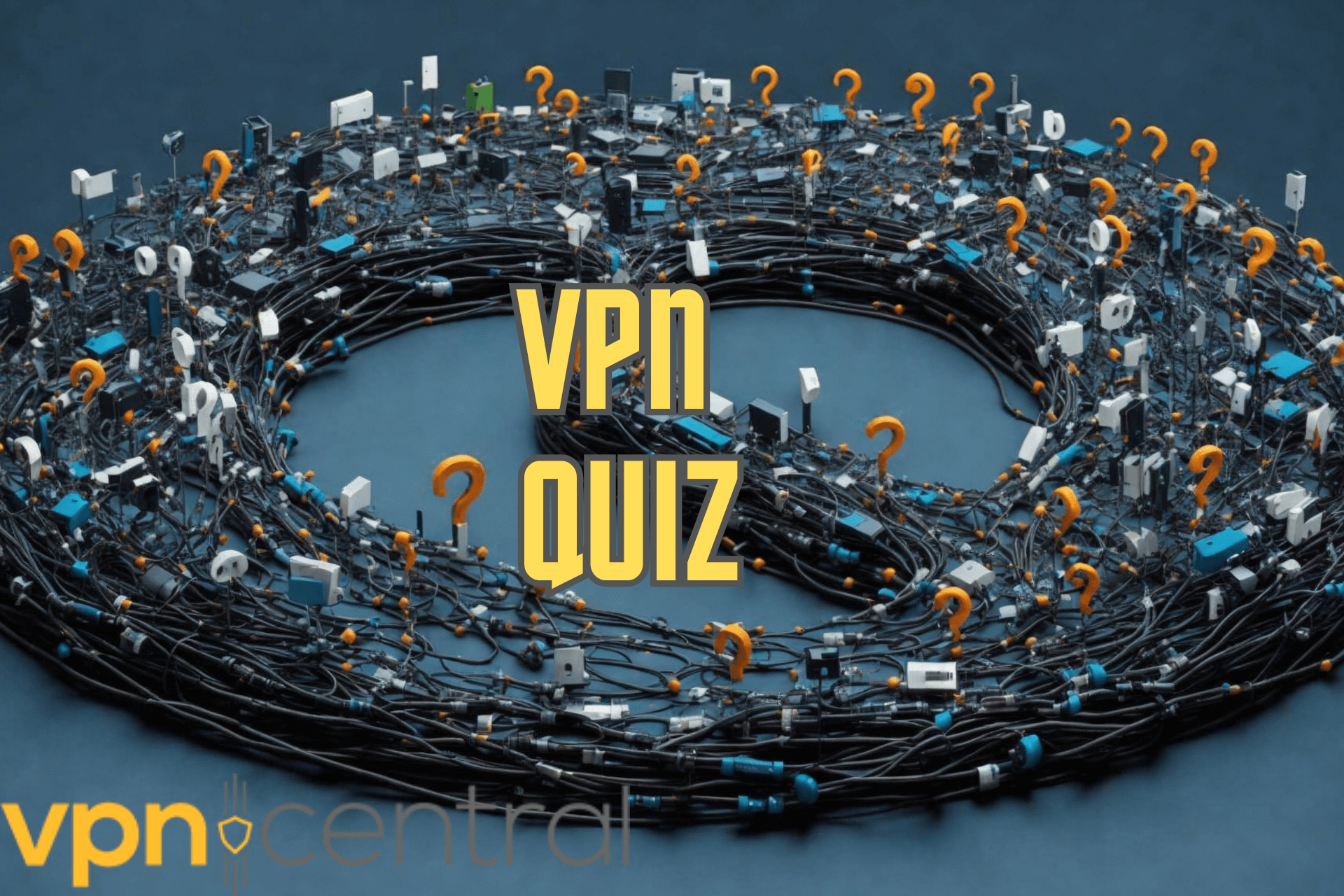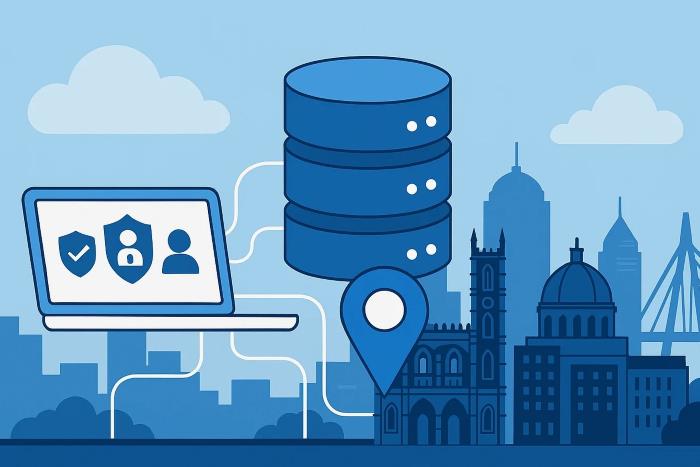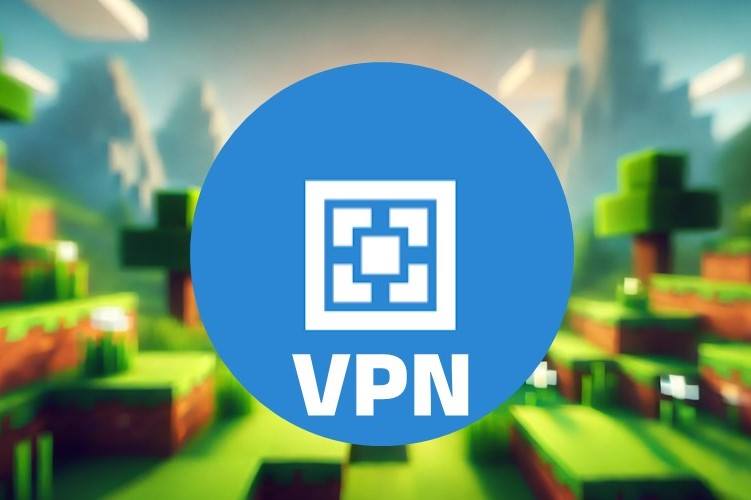The Ultimate VPN Quiz - Test Your VPN Knowledge [FREE]
8 min. read
Updated on
Read our disclosure page to find out how can you help VPNCentral sustain the editorial team Read more

Are you curious about your VPN knowledge?
With the increasing importance of online privacy and security, understanding VPNs has become essential for everyone navigating the digital world.
Whether you’re a beginner or consider yourself an expert, this VPN quiz is designed to challenge you and test your knowledge.
Find out if you are a VPN expert or if you could use some additional knowledge!
Instructions:
- Start the Quiz: Simply scroll down to the first question to begin.
- Select Your Answer: For each question, choose the answer you believe is correct by clicking on the button next to it.
- Submit: Once you’ve answered all the questions, click the “Submit Quiz” button at the bottom.
- View Your Results: You will see your score immediately.
Remember, this VPN quiz is not just a test but a learning experience. Whether you ace it or stumble along the way, there’s always something valuable to take away. Good luck!
1. What does VPN stand for?
Virtual Private NetworkVirtual Public Network
Virtual Protected Network
Virtual Personal Network
2. Why do people commonly use VPNs?
To increase their internet speedTo access geo-restricted content
To make their device run faster
To get free internet access
3. Which protocol is commonly used by VPNs to secure data?
HTTPSMTP
FTP
OpenVPN
4. Which of the following is NOT a reason to use a VPN?
To download illegal contentTo hide your IP address
To encrypt data transfers
To bypass internet censorship
5. Which country is known for NOT having data retention laws favorable to VPNs?
USAUK
Switzerland
China
6. What is a primary purpose of a VPN?
Speeding up internet connectionReplacing antivirus software
Bypassing computer firewalls
Encrypting internet traffic
7. Which of the following is a popular VPN protocol?
IMAPL2TP
POP3
SMTP
8. What does a VPN hide from your ISP?
Your browsing activitiesYour email password
Your computer’s hardware
Your computer’s software
9. Which of the following can a VPN protect you against?
Computer virusesHardware malfunctions
Man-in-the-middle attacks
Software bugs
10. Which device does NOT typically use a VPN?
SmartphoneMicrowave oven
Laptop
Desktop computer
11. Why might someone use a VPN while traveling?
To book cheaper flightsTo translate foreign languages
To charge their devices
To securely use public Wi-Fi
12. What is a common use of a VPN for businesses?
Remote access to company networksVideo conferencing
Data analysis
Social media marketing
13. Which of the following is NOT a type of VPN?
PPTPL2TP/IPsec
DHCP
SSTP
14. Which organization can still see your online activities even when you use a VPN?
Your neighborThe VPN service provider
Your school
Your local grocery store
15. What is the primary disadvantage of using a free VPN?
Limited security and privacyToo many features
Faster internet speed
Better customer support
16. Which VPN protocol is known for being the fastest?
L2TP/IPsecPPTP
SSTP
WireGuard
17. What does a VPN’s “kill switch” do?
Increases internet speedDisconnects internet if the VPN drops
Deletes browsing history
Blocks malicious websites
18. Which country is notorious for its strict online censorship and is a common reason people use VPNs?
CanadaAustralia
China
Germany
19. Which of the following is a benefit of using a VPN?
Bypassing geo-restrictionsIncreasing storage space
Improving computer performance
Repairing computer hardware
20. What is one reason a user might experience slower internet speeds when using a VPN?
The user’s device is outdatedThe user has too many browser tabs open
The user’s ISP is performing maintenance
The VPN server is far from the user’s location
21. Which of the following best describes a “No-Logs” VPN policy?
The VPN does not have a user interface.The VPN does not store user activity or data.
The VPN does not support logging in.
The VPN does not have technical support.
22. What is the main purpose of VPN encryption?
To secure user data and activity.To improve website loading times.
To display better graphics.
To increase the volume of data transfer.
23. Which of the following is NOT a typical use case for a VPN?
Accessing a work network remotely.Watching content from another country.
Boosting the computer’s RAM.
Hiding browsing activity from ISPs.
24. Which of the following can a VPN help protect against when using public Wi-Fi?
Slow connection speeds.Limited data allowance.
Website advertisements.
Eavesdropping and data interception.
25. Which VPN protocol is known for its high level of security but may be slower?
PPTPOpenVPN
L2TP
IKEv2
26. In which of the following scenarios would a VPN be least useful?
Playing offline video games.Accessing a geo-blocked website.
Using public Wi-Fi at a cafe.
Bypassing school or work network restrictions.
27. What does “tunneling” refer to in the context of VPNs?
The process of slowing down internet speed.The method of displaying ads to users.
The technique of securely transmitting data.
The way VPNs store user logs.
28. If a user is primarily concerned about online privacy, what should they look for in a VPN?
Fastest connection speeds.Most server locations.
Cheapest price.
No-logs policy.
29. Which of the following is a potential downside of using a VPN?
Enhanced graphics on websitesSlightly reduced internet speed
Increased storage on the device
Automatic software updates
30. Which of the following is NOT a security feature of a VPN?
Ad-blockerData encryption
Kill switch
IP address masking
31. Which VPN protocol uses SSL 3.0 and can be used with a web browser?
PPTPL2TP
SSTP
IKEv2
32. If a user wants to ensure their VPN is always active when they’re online, what feature should they use?
Split tunnelingDouble VPN
Ad-blocker
Always-on VPN
33. Which of the following is NOT a reason someone might use a VPN?
To encrypt their internet trafficTo increase their device’s battery life
To access content not available in their region
To hide their IP address
34. Which of the following best describes end-to-end encryption?
Data is encrypted from the sender to the receiverData is encrypted only on the sender’s end
Data is encrypted only on the receiver’s end
Data is not encrypted at all
35. What does a VPN hide from websites you visit?
Your nameYour device type
Your real IP address
Your browser bookmarks
36. Which of the following is a risk of not using a VPN on public Wi-Fi?
Reduced battery lifeSlower internet speed
Inability to connect to certain websites
Data interception by malicious actors
37. Which of the following VPN protocols is considered the least secure?
OpenVPNPPTP
L2TP/IPsec
SSTP
38. What is the main advantage of using a VPN with multiple server locations?
Ability to bypass geo-restrictionsFaster connection to local servers
More storage space on the device
Better graphics on websites
39. Which of the following is NOT a typical function of a VPN?
Data encryptionIP address masking
Boosting device storage
Tunneling
40. What is the primary reason for using split tunneling in a VPN?
To increase internet speedTo allow specific traffic outside the VPN
To encrypt all device data
To connect to multiple VPNs simultaneously
41. Which organization can potentially request user data from a VPN company?
Competing VPN companiesInternational travel agencies
Independent hackers
Government agencies
42. Why might some streaming services block VPN users?
To enforce regional content restrictionsTo promote their own VPN services
To improve streaming quality
To increase website traffic
43. What does the term “VPN server” refer to?
The device used to access the internetThe software installed on a user’s device
The remote computer a VPN routes traffic through
The company that provides VPN services
44. What is one of the main reasons people use VPNs for online gaming?
To improve game graphicsTo reduce lag and ping times
To increase game difficulty
To unlock new characters
45. Which of the following is a potential risk when using a VPN?
The VPN will install unwanted softwareThe VPN will physically damage the device
The VPN will take control of the user’s device
The VPN may log and sell user data
46. What is the primary purpose of a VPN’s data encryption?
To protect data from unauthorized accessTo increase internet speed
To compress data for faster transmission
To store data for later retrieval
47. Which of the following activities might get a user banned by their VPN service?
Streaming moviesShopping online
Engaging in illegal activities
Reading news websites
48. Which of the following is NOT a reason why someone might want to change their IP address with a VPN?
To access geo-restricted contentTo update their computer’s operating system
To avoid online tracking
To bypass network restrictions
49. What is a potential disadvantage of using a VPN based in a “Fourteen Eyes” country?
Slower connection speedsFewer server locations
Limited device compatibility
Potential government surveillance
50. Which of the following best describes the term “geo-blocking”?
Restricting content based on a user’s geographic locationBlocking access to all websites
Blocking access to a specific website
Restricting content based on a user’s age









User forum
0 messages